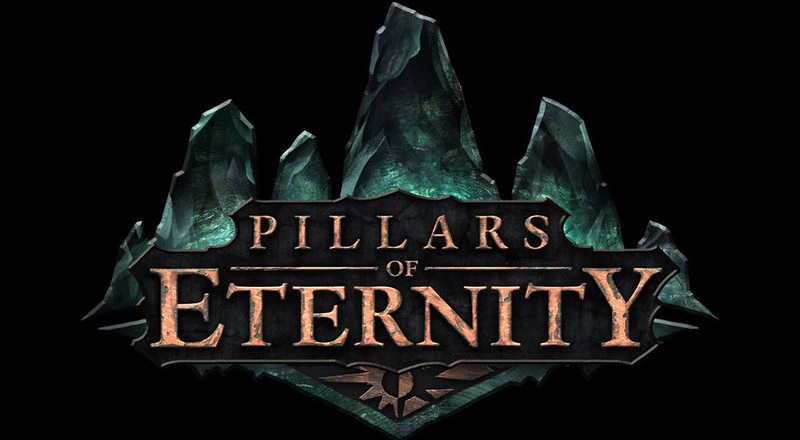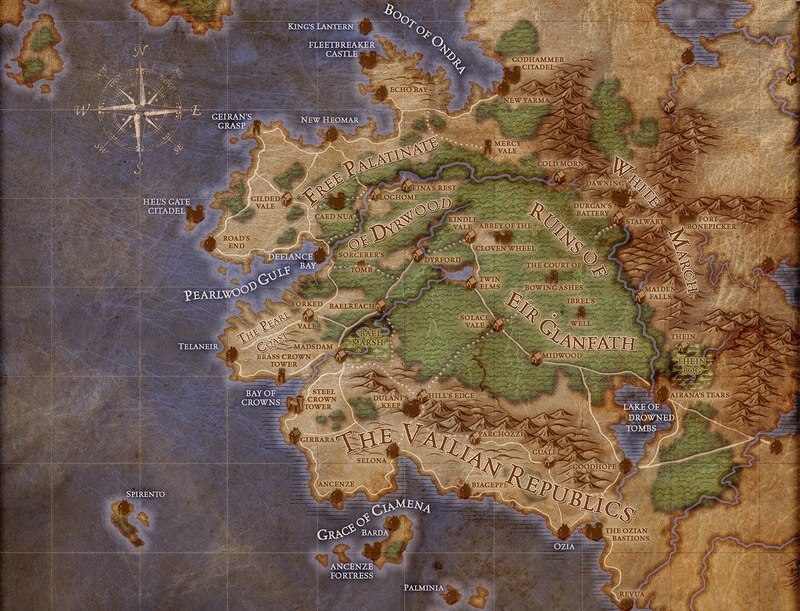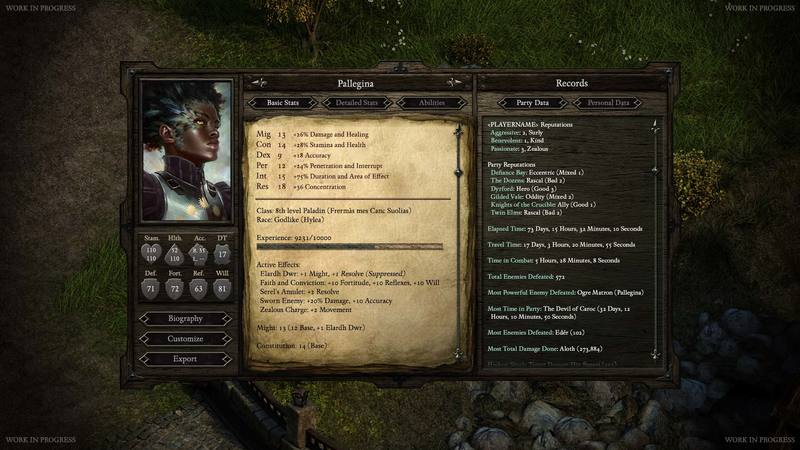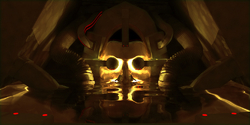RPG Codex Interview: Obsidian's Carrie Patel on Pillars of Eternity
RPG Codex Interview: Obsidian's Carrie Patel on Pillars of Eternity
Codex Interview - posted by Crooked Bee on Sat 26 April 2014, 17:59:14
Tags: Carrie Patel; Obsidian Entertainment; Pillars of Eternity[Interview by Hormalakh]
Carrie Patel is a narrative designer at Obsidian Entertainment, and is currently working on Pillars of Eternity. She is also a writer, and is publishing her first book, "The Buried Life," in July. She has a blog over at http://www.electronicinkblog.com/. Her publisher is AngryRobotBooks. From that website, "Carrie Patel was born and raised in Houston, Texas. An avid traveller, she studied abroad in Granada, Spain and Buenos Aires, Argentina. She completed her bachelor’s and master’s degrees at Texas A&M University and worked in transfer pricing at Ernst & Young for two years." I asked Carrie if she would be willing to answer a few questions and she agreed: then I put it out to the Codex to see what you guys wanted to hear.
Here is the resulting interview.

Hormalakh: Thank you very much for taking the time to speak with us. Before we get started, I’d like to say it’s very refreshing to see someone with your background working as a video game narrative designer – how does someone with a master’s degree focusing on national security and a gig working at Ernst & Young get into the games industry?
Was it a difficult decision for you to change careers or are you doing what you’ve always loved now?
You’re also a writer outside of doing narrative design at Obsidian, and your first book, The Buried Life, is out on July 2014. Congratulations! So, what’s the book about?
What are some of your literary influences and your favorite games?
Your blog also mentioned that you have built a (few?) mods for Neverwinter Nights. Where can we find these mods?

Speaking about games, you’re working on Pillars of Eternity: In your opinion, what are the differences between writing a book and writing for an RPG like Pillars of Eternity?
Can you tell us what you’re currently working on?
This is sort of a process question. In speaking to other narrative designers, we understand that they are not the only ones that contribute to dialogue writing in a game: sometimes area designers contribute too. Does it work the other way around? Are you involved in writing and designing quests for Pillars of Eternity?
What is the most interesting thing to you regarding the lore? Have you been able to contribute to the lore yourself?
One of the most important aspects of an RPG for many players is the quality of the writing and, especially in an Obsidian game, the companion dialogue. Working with Chris Avellone, Eric Fenstermaker and Josh Sawyer, does that leave you with any room to contribute companion dialogue as well? Anything that you can share or does Eric Fenstermaker just steal all of your best ideas and share them as his own?
Speaking of best ideas, how do you find inspiration for yours?
How has working with industry veterans like Eric Fenstermaker, Josh Sawyer, and Chris Avellone helped with the transition from writing literature to writing for video games? Do you have any anecdotes you’d like to share?

Do you have any special security measures in place at Irvine to deal with Josh Sawyer's overzealous fans? What about Chris Avellone’s fans?
What do you find the most difficult aspect of writing for a video game like Pillars of Eternity?
You once wrote, “I guess the moral of the story is that perspective and first impressions are powerful” and “[good fiction] presents complex characters and makes them somehow sympathetic, even when they're not the kind of people you can pull for.” How do you approach making possible antagonists sympathetic when (especially in video games) they do not have the luxury of perspective?
How do you approach the challenge of balancing player agency with trying to tell a story?
What do you think contemporary RPGs do particularly right or wrong in terms of narrative? Are there areas that you think need particular attention?
In recent years, games have moved towards a more cinematic approach, and that has clearly impacted game writing as well. How do you feel about the medium today?
John R. R. or George R. R.?
Thank you for your time.
Thanks to Abelian, Crooked Bee, felipepepe, Lord Trousersnake, sser, Tigranes, tuluse, and Whiskey for the questions. Special thanks to Sensuki for helping with a bunch of the questions and editing them.
Carrie Patel is a narrative designer at Obsidian Entertainment, and is currently working on Pillars of Eternity. She is also a writer, and is publishing her first book, "The Buried Life," in July. She has a blog over at http://www.electronicinkblog.com/. Her publisher is AngryRobotBooks. From that website, "Carrie Patel was born and raised in Houston, Texas. An avid traveller, she studied abroad in Granada, Spain and Buenos Aires, Argentina. She completed her bachelor’s and master’s degrees at Texas A&M University and worked in transfer pricing at Ernst & Young for two years." I asked Carrie if she would be willing to answer a few questions and she agreed: then I put it out to the Codex to see what you guys wanted to hear.
Here is the resulting interview.

Hormalakh: Thank you very much for taking the time to speak with us. Before we get started, I’d like to say it’s very refreshing to see someone with your background working as a video game narrative designer – how does someone with a master’s degree focusing on national security and a gig working at Ernst & Young get into the games industry?
Carrie Patel: When I was looking for a way into the industry, I wondered the same thing! Fortunately, I formed a writing habit early and never managed to kick it. I've been a recreational fiction-writer for years, so when I applied for the job at Obsidian, I had a short story in one hand and a mod in the other (more on that below). The bottom line is, if you're looking to turn your passion into a profession, regular and rigorous practice goes a long way. When the right opportunity shows up, you'll be ready for it.
Was it a difficult decision for you to change careers or are you doing what you’ve always loved now?
I'm doing what I love now. There aren't many jobs where you get paid to make things up, and I don't have the stomach for politics.
You’re also a writer outside of doing narrative design at Obsidian, and your first book, The Buried Life, is out on July 2014. Congratulations! So, what’s the book about?
Thank you! It's about murders and intrigues in an underground city. A police inspector follows a trail of high-profile crimes only to find that the people she's trying to protect may be hiding something bigger. It's about political machinations, old grudges, and secret histories.
What are some of your literary influences and your favorite games?
It's hard for me to pinpoint who I actually emulate, but I'll tell you who I'd love to follow. I love Neal Stephenson -- his books are funny, smart, and thrilling all at the same time, and I'm convinced that the first two pages of Snow Crash would hook anyone. I loved Umberto Eco's The Name of the Rose for the way it bound a fascinating mystery, two surprisingly lovable characters, and interesting theological questions. And I'd also have to mention Dune. I liked the story, and beyond that, I loved the way it fleshed out an entire universe of political and economic conflicts.
On the games front, my big formative experiences were with the old Sierra adventure game series -- King's Quest, Quest for Glory, the Colonel's Bequest. I loved playing through stories that were also puzzles, and it was always satisfying to explore, explore, and explore again and finally find the thing (an old boot, a soup bone) your character inexplicably needed. It was fun even though it was way too easy to play yourself into an unwinnable corner without realizing it.
I've also loved Morrowind -- it was the perfect blend of sandbox and story in a nontraditional world, and it just goes to show that you don't need to play a plumber to travel a world with giant mushrooms. I had tons of fun with both the combat and the storyline of the Mass Effect series, and I loved stealthing my way through Deus Ex: Human Revolution. For something a little different, Braid and The Stanley Parable did amazing things with experimental storytelling while unfolding their narratives with unique but fitting gameplay. The Stanley Parable is one of the funniest games I've ever played, and even though it's brief, I was as engrossed in it as I've ever been in bigger, more produced games. And the end of Braid is one of my favorite "aha" moments in any game. And, of course, Planescape Torment is a great example of a unique and immersive narrative -- even though character customization is limited, the choices presented to the player make the experience every bit as personal as if you'd built the character from scratch.
On the games front, my big formative experiences were with the old Sierra adventure game series -- King's Quest, Quest for Glory, the Colonel's Bequest. I loved playing through stories that were also puzzles, and it was always satisfying to explore, explore, and explore again and finally find the thing (an old boot, a soup bone) your character inexplicably needed. It was fun even though it was way too easy to play yourself into an unwinnable corner without realizing it.
I've also loved Morrowind -- it was the perfect blend of sandbox and story in a nontraditional world, and it just goes to show that you don't need to play a plumber to travel a world with giant mushrooms. I had tons of fun with both the combat and the storyline of the Mass Effect series, and I loved stealthing my way through Deus Ex: Human Revolution. For something a little different, Braid and The Stanley Parable did amazing things with experimental storytelling while unfolding their narratives with unique but fitting gameplay. The Stanley Parable is one of the funniest games I've ever played, and even though it's brief, I was as engrossed in it as I've ever been in bigger, more produced games. And the end of Braid is one of my favorite "aha" moments in any game. And, of course, Planescape Torment is a great example of a unique and immersive narrative -- even though character customization is limited, the choices presented to the player make the experience every bit as personal as if you'd built the character from scratch.
Your blog also mentioned that you have built a (few?) mods for Neverwinter Nights. Where can we find these mods?
You can find my mod here: http://www.electronicinkblog.com/p/mods.html
My goal was to practice scripting and to demonstrate to potential employers that I could (1) use a dialogue editor and (2) craft a nonlinear narrative through character interaction. With that in mind, it's short and relatively unpolished, but playing around with the Aurora Toolset was a great (and supremely fun) learning experience.
My goal was to practice scripting and to demonstrate to potential employers that I could (1) use a dialogue editor and (2) craft a nonlinear narrative through character interaction. With that in mind, it's short and relatively unpolished, but playing around with the Aurora Toolset was a great (and supremely fun) learning experience.

Speaking about games, you’re working on Pillars of Eternity: In your opinion, what are the differences between writing a book and writing for an RPG like Pillars of Eternity?
When you're writing a book, much of the process is between you and the voices in your head. Since games are collaborative, there's lots of play between narrative, level design, and art (oh, and programming!). That means that your contributions have to fit with the tapestry that everyone else is weaving, but it also means that you get to collaborate with incredible people with very different skills whose work will ultimately enhance yours.
Can you tell us what you’re currently working on?
Currently, I'm writing dialogue for the end of the critical path.
This is sort of a process question. In speaking to other narrative designers, we understand that they are not the only ones that contribute to dialogue writing in a game: sometimes area designers contribute too. Does it work the other way around? Are you involved in writing and designing quests for Pillars of Eternity?
Most of the quests in Pillars of Eternity have received some level of area design implementation by the time they get a narrative pass. So the degree of wiggle room varies from one quest to another, but we always look for ways to tie the story and lore more closely to individual quests without discarding the excellent design work that's gone into them. This may mean changing the backstory of an NPC to make him more relevant, changing quest dialogue while keeping the quest's original sequence of events, or, sometimes, changing a few of the quest's steps to build a more engaging narrative. We always discuss larger changes to make sure that the end product results in a good story and a satisfying gaming experience.
What is the most interesting thing to you regarding the lore? Have you been able to contribute to the lore yourself?
Unfortunately, I can't share my favorite lore tidbit! But I love our take on the undead, which Eric Fenstermaker described in one of the project updates. Much of the lore was in place (in some form) before I started, but it tends to get tweaked and refined over the development process. When I've contributed to lore, it's most often involved taking components we already have -- creature designs, cultural traits -- and molding them into something specific that fits in our world (for instance, bestiary lore and tribal identities). It's like Top Chef for worldbuilding. Here are your ingredients! What can you do with them?
One of the most important aspects of an RPG for many players is the quality of the writing and, especially in an Obsidian game, the companion dialogue. Working with Chris Avellone, Eric Fenstermaker and Josh Sawyer, does that leave you with any room to contribute companion dialogue as well? Anything that you can share or does Eric Fenstermaker just steal all of your best ideas and share them as his own?
I will be writing one or two of our companions, and this is one of the things I've looked forward to the most. I couldn't possibly agree that Eric steals my ideas (if I did, he'd probably steal my desk chair, too).
Speaking of best ideas, how do you find inspiration for yours?
If only I knew! I would engineer many, many more such moments. Sometimes, the right mood just hits you and you find yourself connecting the dots. At other times, it can be great to brainstorm with other writers and riff off of each others' ideas. When all else fails, I'm a big fan of analysis -- making notes of what your narrative needs to accomplish, what you have to work with, and where you still need more cowbell.
How has working with industry veterans like Eric Fenstermaker, Josh Sawyer, and Chris Avellone helped with the transition from writing literature to writing for video games? Do you have any anecdotes you’d like to share?
One of the great things about the team culture is that anyone can suggest an idea. If it fits, the leads will take it, and if it doesn't, they'll explain why. As a rookie, this encourages you to throw your best ideas out there, and it helps you learn from your not-so-great ideas. I work most closely with Eric Fenstermaker, and I've gotten the benefit of a lot of joint brainstorming sessions where he'll quickly strike the suggestions that don't fit and explore the ones that do. It's useful to observe a veteran's process in a meeting like that.

Do you have any special security measures in place at Irvine to deal with Josh Sawyer's overzealous fans? What about Chris Avellone’s fans?
And you wondered how someone with a degree in national security got this job...
What do you find the most difficult aspect of writing for a video game like Pillars of Eternity?
Accounting for all of the extremes of player agency is challenging. One of our goals is to create a story that people can play however they want, but that means that when you're writing and scripting, you have to consider all of the secondary ways someone could try to complete the game. What if the player kills this NPC? Would exploring this area too early break the story? You don't want players to feel shackled, but you don't want to create situations where they might end up with an unplayable mess. So you set up failsafes to guide them through the key moments so that they can ultimately play however they want and still enjoy the full game.
You once wrote, “I guess the moral of the story is that perspective and first impressions are powerful” and “[good fiction] presents complex characters and makes them somehow sympathetic, even when they're not the kind of people you can pull for.” How do you approach making possible antagonists sympathetic when (especially in video games) they do not have the luxury of perspective?
By giving the antagonist believable motives that become personal for the player. Ideally, the antagonist has reasons for her shenanigans, and ideally, they connect to the big picture questions of the game. And if the player is facing these questions throughout the game -- in quests, NPC interactions, and companion relationships -- then by the end, he'll have seen many sides of them. Perhaps some that make the antagonist's position relatable if not actually sympathetic. And whether or not the player actually sides with the antagonist, he'll at least have an understanding of her position and how she reached it.
Of course, not every antagonist has to be sympathetic. They can be 31 flavors of vile, and sometimes that's better.
Of course, not every antagonist has to be sympathetic. They can be 31 flavors of vile, and sometimes that's better.
How do you approach the challenge of balancing player agency with trying to tell a story?
You start with a basic assumption about what players are looking for in your game. Something like Pillars of Eternity is meant to offer player agency, but it isn't meant to be a sandbox. You're telling a story, and that story is about certain questions (for example, "what can change the nature of a man?"). The story will always be about those questions, but the player chooses how to answer them. So you want to give the player options about how to progress through the story while making sure that those options are actually relevant to the story.
What do you think contemporary RPGs do particularly right or wrong in terms of narrative? Are there areas that you think need particular attention?
The field is large enough that it's hard for me to generalize. For any critique I could think of, there's a game somewhere that demonstrates the exception. And perhaps that's what I like -- there's a broad swath of games from high-budget, AAA titles to no-budget indies, and you can find great (and different) games across the spectrum.
In recent years, games have moved towards a more cinematic approach, and that has clearly impacted game writing as well. How do you feel about the medium today?
As technology improves, developers will inevitably make use of those advances (particularly for AAA titles). As you indicate, that will sometimes lead to a focus on more cinematic games, which may lend themselves to more linear narratives: the player is more deliberately shepherded from one plot point to the next, meaning that the "open world" feeling may diminish but the game may track the story arc more closely (also, maintaining that cinematic production value for a more open game can be cost-prohibitive). I don't see this as a good or bad thing so long as we continue to have variety, and games like Pillars of Eternity demonstrate that there's still a lot of interest in other styles and that it's possible to be epic without being cinematic.
John R. R. or George R. R.?
George! In the interest of full disclosure, I read Tolkien many years ago, so A Song of Ice and Fire is much fresher in my mind. That said, I appreciate the gray area in Martin's fiction -- morally ambiguous characters face morally fraught quandaries, and even though it's not Good vs. Evil, it takes place on a grand scale. His world feels grittier and more "real," but it's still richly imaginative.
Thank you for your time.
Thanks to Abelian, Crooked Bee, felipepepe, Lord Trousersnake, sser, Tigranes, tuluse, and Whiskey for the questions. Special thanks to Sensuki for helping with a bunch of the questions and editing them.
There are 65 comments on RPG Codex Interview: Obsidian's Carrie Patel on Pillars of Eternity














